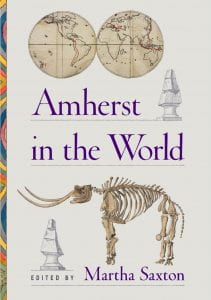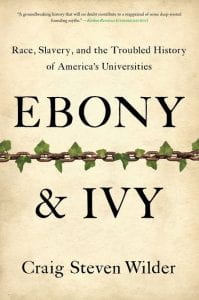Amherst College History
 Bicentennial Resources: Preparations for the Amherst College Bicentennial in 2021-22 include a website with a timeline and links out to online resources on Amherst history, including three newly-published books. Amherst in the World is freely available online and includes essays on several topics related to the history of race at Amherst College. The Archives maintains a “Sources on College History” page and a “College History Virtual Bookshelf” with links to more online resources.
Bicentennial Resources: Preparations for the Amherst College Bicentennial in 2021-22 include a website with a timeline and links out to online resources on Amherst history, including three newly-published books. Amherst in the World is freely available online and includes essays on several topics related to the history of race at Amherst College. The Archives maintains a “Sources on College History” page and a “College History Virtual Bookshelf” with links to more online resources.
Digital Scholarship Summer Fellowship: Since the summer of 2014, Frost Library’s Digital Programs department has run a summer fellowship program that introduces students to the world of the digital humanities. Several of these projects have used DH tools to explore college history. Links to all of their projects are on the Digital Scholarship Summer Fellowship page. The 2016 projects, Amherst Reacts: How Amherst Students Responded to Their World, includes a timeline of student protests on campus.
The Consecrated Eminence: Archives & Special Collections has maintained a blog since 2011. Several posts have addressed different aspects of race in the history of the college. Highlights include: Black Men of Amherst, 1877-1883, Black Lives of Amherst College: Non-Alumni Edition, Doshisha University and Joseph Hardy Neesima, Mens Sana in Corpore Sano: Anthropometry at Amherst College, The Moon and Scientific Racism, Divesting Amherst College, The Amherst College Anti-Slavery Society, “Oh, Lord Geoffrey Amherst Was a Soldier of the King,” and many more.
Amherst College Digital Collections: The Digital Programs department in Frost Library works closely with the teams in the Archives & Special Collections and the Technical Services department to make college history resources freely available online through Amherst College Digital Collections (ACDC). The Digital Programs blog includes a wealth of information on how materials were selected and prepared for digitization and technical details of their work.
Projects on Amherst and Race
Amherst Uprising (2015): In the Fall semester 2020, a website was developed in fall 2020 to commemorate the fifth anniversary of the Amherst Uprising of 2015. The Bicentennial Events webpage includes recordings of online events and lectures marking the Uprising anniversary with links to additional resources on that event.
Black Women of Amherst:A Storytelling Project: “We, as Amherst College alumnae and students, are telling our stories to bridge historical and present-day experiences, and to illuminate the accomplishments and wisdom of the Black women of Amherst College. We invite you to listen to recorded stories and tell us your own story. Then join us this fall for our podcast series plus a series of live conversations in a virtual Drew House that we will build together. Here, all the Black Women of Amherst College can talk, share, learn and laugh. This project celebrates alumnae, current students, faculty, staff, potential students and future generations.”
Slavery and Higher Education
“The American college trained the personnel and cultivated the ideas that accelerated and legitimated the dispossession of Native Americans and the enslavement of Africans. Modern slavery required the acquiescence of scholars and the cooperation of academic institutions. Faculties and officers embraced the benefits of human slavery and extrapolated from the enslavement of Africans and the destruction of Native civilizations predictions of a future in which vast populations of the world would be eternally subjected or inevitably eradicated.” (Craig Wilder. Ebony & Ivy. p. 10).
Books:
 Ebony & Ivy: Race, Slavery, and the Troubled History of America’s Universities by Professor Craig Steven Wilder is currently the best single book on the topic of race, slavery, and higher education. Professor Wilder is at MIT where he teaches a course as part of the ongoing MIT and Slavery project.
Ebony & Ivy: Race, Slavery, and the Troubled History of America’s Universities by Professor Craig Steven Wilder is currently the best single book on the topic of race, slavery, and higher education. Professor Wilder is at MIT where he teaches a course as part of the ongoing MIT and Slavery project.
Slavery and the University: Histories and Legacies is a collection of essays that address various aspects of this history published by the University of Georgia Press in 2019.
Slavery in the North: Forgetting History and Recovering Memory by Marc Howard Ross explores both the history of slavery in the North and the processes by which that history has been erased and obscured over the past 200 years.
Disowning Slavery: Gradual Emancipation and “Race” in New England, 1780-1860 by Joanne Pope Melish provides a deep exploration of the gradual disappearance of slavery in New England, with special reference to the impact that the erasure of that history has on the present. This book is available online through JSTOR.
Report of the Brown Steering Committee on Slavery and Justice is freely available online and includes excellent historical information on the practice of slavery in New England.
Web Resources:
Universities Studying Slavery Consortium. “Universities Studying Slavery (USS) is dedicated to organizing multi-institutional collaboration as part of an effort to facilitate mutual support in the pursuit of common goals around the core theme of “Universities Studying Slavery.” USS additionally allows participating institutions to work together as they address both historical and contemporary issues dealing with race and inequality in higher education and in university communities as well as the complicated legacies of slavery in modern American society. USS hosts semi-annual meetings to discuss strategies, collaborate on research, and learn from one another.”
Princeton & Slavery. “The Princeton & Slavery Project investigates the University’s involvement with the institution of slavery. It explores the slave-holding practices of Princeton’s early trustees and faculty members, considers the impact of donations derived from the profits of slave labor, and looks at the broader culture of slavery in the state of New Jersey, which did not fully abolish slavery until 1865. It also documents the southern origins of many Princeton students during the ante-bellum period and considers how the presence of these southern students shaped campus conversations about politics and race.” This site includes some excellent DH visualizations.
Columbia University and Slavery: Student Exhibits. Data visualizations and online exhibits prepared by students researching the legacy of slavery at Columbia University in New York City.
The Price of Georgetown: A Walking Tour of Slavery, Memory and Reconciliation at Georgetown University. Georgetown University has developed a wealth of online resources around the deep involvement of the Jesuit community in North America with slavery. This walking tour is an attempt to present some of the findings in the Georgetown Slavery Archive to a wider public.
Slave Voyages. “The Trans-Atlantic and Intra-American slave trade databases are the culmination of several decades of independent and collaborative research by scholars drawing upon data in libraries and archives around the Atlantic world. The new Voyages website itself is the product of three years of development by a multi-disciplinary team of historians, librarians, curriculum specialists, cartographers, computer programmers, and web designers, in consultation with scholars of the slave trade from universities in Europe, Africa, South America, and North America. The National Endowment for the Humanities was the principal sponsor of this work carried out at Emory Center for Digital Scholarship, the University of California at Irvine, and the University of California at Santa Cruz. The Hutchins Center of Harvard University has also provided support.”
Visualizing Emancipation. “Visualizing Emancipation is a map of slavery’s end during the American Civil War. It finds patterns in the collapse of southern slavery, mapping the interactions between federal policies, armies in the field, and the actions of enslaved men and women on countless farms and city blocks. It encourages scholars, students, and the public to examine the wartime end of slavery in place, allowing a rigorously geographic perspective on emancipation in the United States.”
Enslaved.org: Peoples of the Historical Slave Trade. “With the help of scholars, educators, and family historians, Enslaved: Peoples of the Historical Slave Trade (Enslaved.org) is rapidly expanding in 2021. We are building a robust, open-source architecture to discover, connect, and visualize 600,000 (and growing) people records and 5 million data points. From archival fragments and spreadsheet entries, we see the lives of the enslaved in richer detail. Explore the data and life stories on Enslaved.org and read articles on data-driven research about the lives of the enslaved in the Journal of Slavery and Data Preservation.”

You must be logged in to post a comment.